The Voice of Nankai University at the Teaching Excellence Summit
The Teaching Excellence Summit, with the theme of “Building Knowledge, Transforming Skills”, was successfully held from November 16 to 18 jointly by Nankai University and Times Higher Education. Nearly 50 leaders and renowned experts and scholars from 32 world-renowned universities and higher education institutions in 13 countries and regions contributed wonderful ideas and suggestions in their extensive and in-depth discussions online and offline. Among them, 5 speakers of Nankai University attended the summit and shared their thoughts.
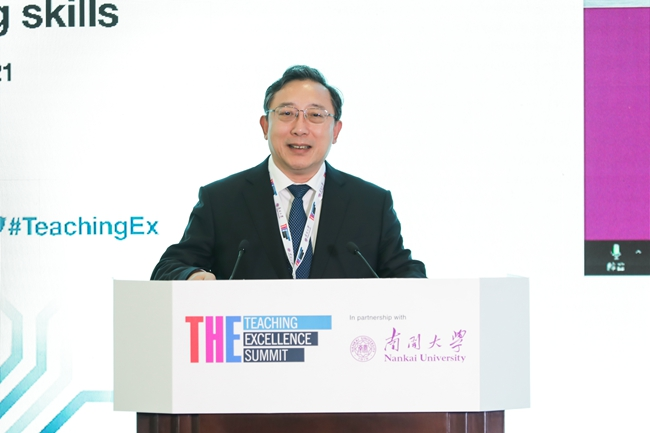
As a keynote speaker at the opening ceremony, Cao Xuetao, academician of the Chinese Academy of Engineering and president of Nankai University, delivered a speech titled “Implementation of teaching excellence at Nankai University in the new era”, which highlights Nankai’s exploratory trails and understandings to teaching excellence.
He reflected the teaching practice of Nankai from history to present. He said that Nankai University has always been an active explorer and practitioner of teaching excellence for Chinese higher education, adhering to the motto of “Dedication to public interests, acquisition of all-round capability, and aspiration for progress with each passing day” and the tenet of “Knowing China and serving China”. He mentioned “4211 Seeking Excellence Initiative” launched b at its centenary in 2019, which aims at promoting the development of the university in the new century with teaching excellence and outstanding scientific research, providing the society with high-quality educational resources and academic research achievements. He indicated that Nankai University’s teaching philosophy is derived from Nankai’s motto, which emphasizes on the tradition of patriotism, commitment, competence and innovation. He introduced a serious of student-oriented teaching plans, such as the “8+4+X” talents selection system on the basis of undergraduate programs, the smart college system and O-AMAS effective teaching method that belonged to the shared development community for teachers and students.
At the same time, the university provides students with a diversified curriculum system and more flexible online and offline teaching resources, while adhering to the open-up enrollment by aiming at the construction goal of a world-class university, giving teachers and students a broad international perspective and opportunities to pursue excellence. He said that “Nankai University always focuses on global mind and openness.” and pointed that high-end cooperation projects with world-class universities and Nankai’s active participation in global educational governance.
President Cao also pointed out that our world is undergoing the most unprecedented and profound changes. A new round of technological innovation and industrial transformation is burgeoning. Social and cultural diversity are continuously accelerating. The uncertainty of the global pandemic has brought new challenges to higher education, in integration, connection, and coordination. Our discussion today is of great significance for resolving these dilemmas in revolutionary ways. Colleges and universities should deepen consensus and carry out close collaboration in the field of teaching excellence, pool their efforts in talent cultivation, teaching reform, curriculum development, research cooperation, and international exchanges, etc., and join hands to cultivate global talents facing the world and the future. Especially in the post-pandemic era, teaching excellence is vital for students' development and guiding them to be responsible for the involvement in the world and building a community of shared future of mankind, and finally leading them to make contributions to the prosperity and development of the world.
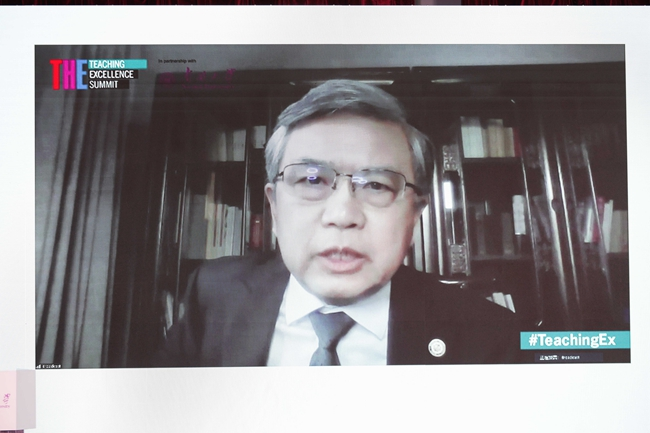
At the panel “Instilling a Passion for Life-long Learning: How Can Universities Do It”, Gong Ke, president of the World Federation of Engineering Organizations and also the former president of Nankai University, talked about life-long learning at Nankai University and at the WEFO. He proposed that compared with continuing education, it is of more importance to foster the mind and methods of life-long learning for students when they are in the campus.
He stressed that we should not consider the higher education as the last stop for learning. Instead, it is only a stage to enhance the foundation of knowledge and a start to strive towards life-long learning. In order to reach this goal, Nankai has launched faculty training and student tutorials.
He said: “It is easy to have exams for students, but it is difficult to check the learning skills really got from teaching. It is the very challenge we are facing.” He mentioned the efforts made by the World Federation of Engineering cooperated with its partners in updating benchmark for engineering education, which transfers the focus to learning skills.
He also made suggestions to Times Higher Education that the assessment criteria should be changed in terms of performances of universities as well as students and the capability of life-long learning should be placed great importance on.
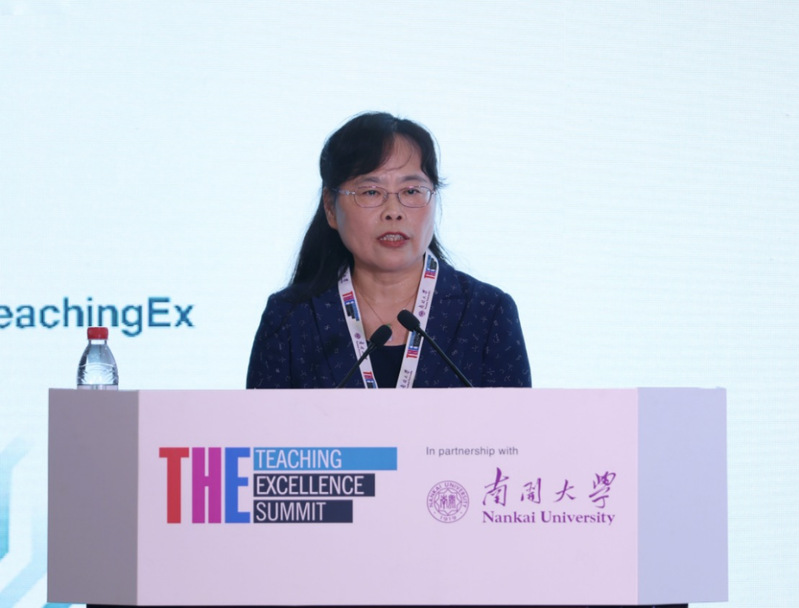
Li Chuanyong, director of the Office of Academic Affairs of Nankai University, gave a talk at the panel “How to Create an Environment for Quality Teaching”. She pointed out that in the face of the pandemic, Nankai University, in both hardware and software aspects, have offered teachers and students a quite deal of support and help, which is very effective.
When discussing the importance of hardware facilities, she proposed that the construction of hardware facilities is crucial to the development of the university. She said: “hardware is cold and hard.” Besides making good use of the hardware, teachers and students should attach greater importance to creating a new teaching culture, namely the “soft environment”. Based on this, she introduced a community with shared development for teachers and students that Nankai is now striving to establish.
The community is learning-oriented and brings mutual benefits for teaching and learning at the same time. She mentioned frequent “teacher to teacher” exchanges on teaching every year, explored “teacher to student” interaction, the academic and advising platform and the smart college system, and introduced “student to student” learning center for communication and study. She identified that only by conducting this kind of “soft environment” can teachers teach energetically while students learn actively.
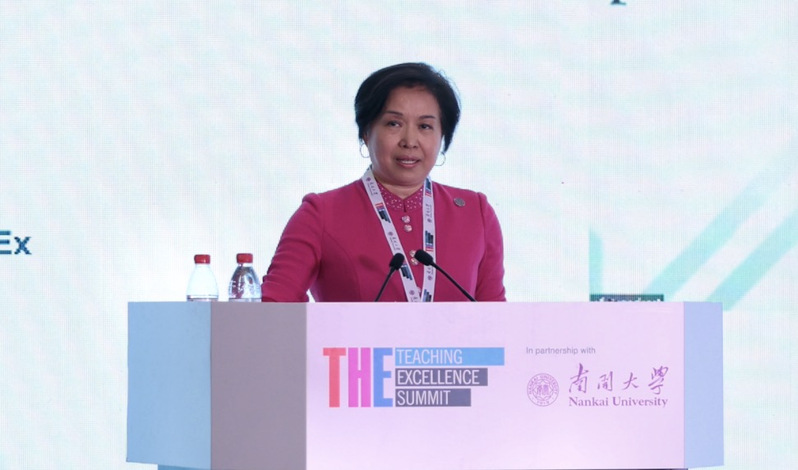
Qiu Hanqin, dean of the College of Tourism and Service Management, discussed online learning at the panel “Building an Inclusive Classroom in an Online World”. She pointed out that online learning has been playing a very important role in teaching and learning at Nankai University. Along with the pandemic, online learning has become even more important in terms of quality teaching and teacher-student interaction.
She indicated that Nankai University has made a series of efforts in online learning. As for the construction of software and hardware, Nankai has opened live classrooms and developed online learning platforms to ensure the running of online and offline learning for students. In the area of the training for teachers, Nankai performs a quick response and harvests effective training.
She also discussed the inclusiveness and equality of online learning and talked about the experience got from the College of Tourism and Service Management. She mentioned the curriculum design on the college online learning platform from the equality perspective and introduced a learning model that combines online learning with offline workshops from the inclusiveness perspective. She also elaborated on the important role that the smart college system plays in being inclusive and providing a comfortable and friendly learning environment.
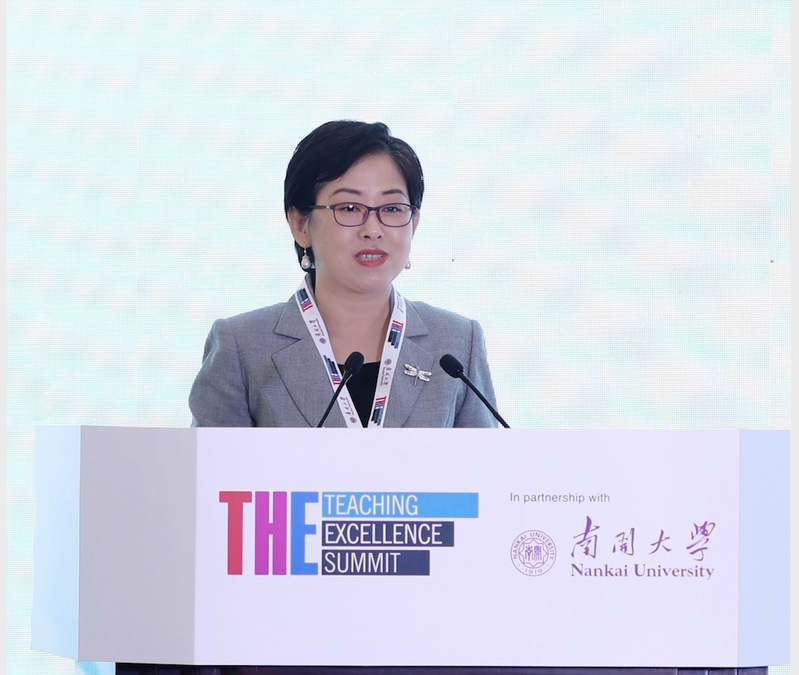
Li Xia, vice-dean of the College of Foreign Languages, spoke at the panel “Is this a new era for experiential learning?” She introduced the experiential learning at Nankai, from “Knowing China and Serving China” mentioned by Zhang Boling, the founding president of Nankai University, to the present achievements. She identified the present experiential learning at Nankai from the spatial dimension----inside and outside the classroom.
Outside the classroom, she introduced practical courses of Nankai aiming at solving practical problems in social life, such as courses about helping to purify drinking water in poor areas, teaching English in remote rural areas and so on.
Inside the classroom, she presumed that experiential learning is more of a philosophy than a methodology, the core of which is the focus on the holistic development and education for students.
When exploring the specific Nankai experience with regard to experiential learning, she introduced the O-AMAS effective teaching methods developed spontaneously by the effective teaching team of Nankai. She stressed that the teaching achievements are the greatest reward for teachers’ hard work and the meaning for teachers’ career.
(Reported by Wang Liuqing, edited and translated by Nankai News Team.)









